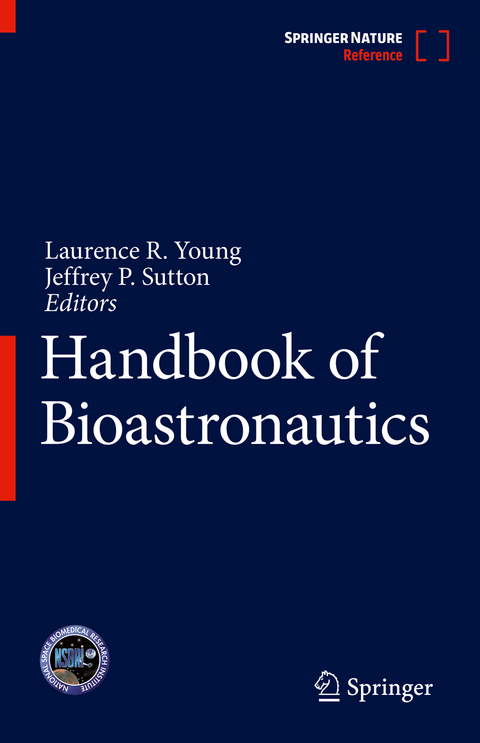
Handbook of Bioastronautics
Springer International Publishing (Verlag)
978-3-319-12190-1 (ISBN)
Laurence R. Young is the Apollo Program Professor of Astronautics and Professor of Health Sciences and Technology at the Massachusetts Institute of Technology. He was the founding Director (1997-2001) of the National Space Biomedical Research Institute. He directs Harvard's HST Ph.D. program in Bioastronautics. Dr. Young was elected to the National Academy of Engineering and the Institute of Medicine of the NAS and is a full member of the International Academy of Astronautics. He received an B.A.. from Amherst College in 1957; a Certificate in Applied Mathematics from the Sorbonne, Paris, as a French Government Fellow in 1958; S.B. and S.M. degrees in Electrical Engineering and the Sc.D. degree in Instrumentation from MIT, from 1957-1962. Dr. Young has been active on many professional and government committees, including the Air Force Scientific Advisory Board for which he chaired the Airlift Panel and received the Air Force Decoration for Exceptional Civilian Service, the Space Medicine and Biology Committee of the National Academy of Sciences, NASA's Life Science Advisory Committee and the NIH Training Committee on Biomedical Engineering. He serves on several NASA Advisory panels relating to life sciences and the Space Station. He currently serves on the Institute of Medicine Standing Committee on Aerospace Medicine and the Medicine of Extreme Environments (CAMMEE). He is also a member of the Bárány Society for vestibular research, the Human Factors Society, and the Aerospace Medical Association. He is a Fellow of the IEEE, The Biomedical Engineering Society, The American Institute of Medical and Biological Engineering and the Explorers Club. Professor Young's contributions to the aerospace medical field have been in instrumentation (eye movement measurement) and basic and applied research in the field of vestibular function. Dr. Young is also recognized for his leadership in the aerospace human factors including applications of manual control theory, and especially for his research on adaptive manual control. His work on the vestibular system has led to his role as principal investigator for experiments on vestibular adaptation to weightlessness conducted aboard five Spacelab missions for which he received NASA's Public Service Group Achievement Award. Author of more than 200 journal articles, Prof. Young serves on the Scientific Advisory Board for the Encyclopedia of Neuroscience. Jeffrey P. Sutton is President, CEO and Institute Director of NSBRI. Dr. Sutton holds the Friedkin Chair for Research in Sensory System Integration and Space Medicine at Baylor College of Medicine, where he is also Professor of Medicine and Director of the Center for Space Medicine. Dr. Sutton is also an affiliate faculty member in the Harvard-MIT Division of Health Sciences and Technology. Dr. Sutton's education and training were at the University of Toronto and Harvard University. He holds M.D., M.Sc. and Ph.D. (theoretical physics) degrees, and is a Fellow of the Royal College of Physicians of Surgeons of Canada and a Diplomate of the American Board of Psychiatry and Neurology. Dr. Sutton's research expertise is in smart medical systems, computational neuroscience and neuroimaging. He has made significant contributions through scholarly publications and patents to these fields. His research, medical practice and teaching were integrated for more than a decade at Harvard Medical School and the Massachusetts General Hospital, prior to his appointment as NSBRI Director in 2001. Dr. Sutton's academic leadership is internationally acclaimed, and he has received numerous awards for his achievements, including the NASA Distinguished Public Service Medal, an NIH Career Development Award, President's Citation from the Society of NASA Flight Surgeons and Diploma from IBMP of the Russian Academy of Sciences.
The Space Environment.- Life Support Systems.- Physiological Effects of Space Flight: Microgravity.- Space Radiation.- Psychological Aspects of Space Flight.- Careers and Education.- Astrobiology.- Space Biology Facilities.- Space Medicine.- Space Flight Analogs.- Human Space Flight Accidents and Incidents.- Highlights of Human Space Flight: Dates, Goals.- Future Human Exploration Challenges.- Astronaut Perspective.
| Erscheint lt. Verlag | 17.8.2021 |
|---|---|
| Reihe/Serie | Handbook of Bioastronautics |
| Zusatzinfo | XXVII, 971 p. 191 illus., 127 illus. in color. |
| Verlagsort | Cham |
| Sprache | englisch |
| Maße | 155 x 235 mm |
| Themenwelt | Technik ► Luft- / Raumfahrttechnik |
| Schlagworte | Aerospace Human Factors • Astrobiology • Clinical Application of Bioastronautics • Life support systems • Physiological Effects of Weightlessness • radiation biology • Space Biomedical Research • Space medicine • Space physiology • Space Science Medicine |
| ISBN-10 | 3-319-12190-1 / 3319121901 |
| ISBN-13 | 978-3-319-12190-1 / 9783319121901 |
| Zustand | Neuware |
| Haben Sie eine Frage zum Produkt? |
aus dem Bereich


